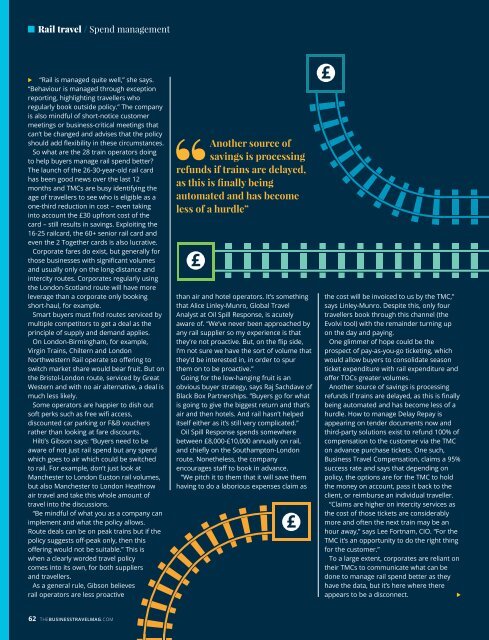You also want an ePaper? Increase the reach of your titles
YUMPU automatically turns print PDFs into web optimized ePapers that Google loves.
Rail travel / Spend management<br />
“Rail is managed quite well,” she says.<br />
“Behaviour is managed through exception<br />
reporting, highlighting travellers who<br />
regularly book outside policy.” <strong>The</strong> company<br />
is also mindful of short-notice customer<br />
meetings or business-critical meetings that<br />
can’t be changed and advises that the policy<br />
should add flexibility in these circumstances.<br />
So what are the 28 train operators doing<br />
to help buyers manage rail spend better?<br />
<strong>The</strong> launch of the 26-30-year-old rail card<br />
has been good news over the last 12<br />
months and TMCs are busy identifying the<br />
age of travellers to see who is eligible as a<br />
one-third reduction in cost – even taking<br />
into account the £30 upfront cost of the<br />
card – still results in savings. Exploiting the<br />
16-25 railcard, the 60+ senior rail card and<br />
even the 2 Together cards is also lucrative.<br />
Corporate fares do exist, but generally for<br />
those businesses with significant volumes<br />
and usually only on the long-distance and<br />
intercity routes. Corporates regularly using<br />
the London-Scotland route will have more<br />
leverage than a corporate only booking<br />
short-haul, for example.<br />
Smart buyers must find routes serviced by<br />
multiple competitors to get a deal as the<br />
principle of supply and demand applies.<br />
On London-Birmingham, for example,<br />
Virgin Trains, Chiltern and London<br />
Northwestern Rail operate so offering to<br />
switch market share would bear fruit. But on<br />
the Bristol-London route, serviced by Great<br />
Western and with no air alternative, a deal is<br />
much less likely.<br />
Some operators are happier to dish out<br />
soft perks such as free wifi access,<br />
discounted car parking or F&B vouchers<br />
rather than looking at fare discounts.<br />
Hilti’s Gibson says: “Buyers need to be<br />
aware of not just rail spend but any spend<br />
which goes to air which could be switched<br />
to rail. For example, don’t just look at<br />
Manchester to London Euston rail volumes,<br />
but also Manchester to London Heathrow<br />
air travel and take this whole amount of<br />
travel into the discussions.<br />
“Be mindful of what you as a company can<br />
implement and what the policy allows.<br />
Route deals can be on peak trains but if the<br />
policy suggests off-peak only, then this<br />
offering would not be suitable.” This is<br />
when a clearly worded travel policy<br />
comes into its own, for both suppliers<br />
and travellers.<br />
As a general rule, Gibson believes<br />
rail operators are less proactive<br />
Another source of<br />
savings is processing<br />
refunds if trains are delayed,<br />
as this is finally being<br />
automated and has become<br />
less of a hurdle”<br />
£<br />
than air and hotel operators. It’s something<br />
that Alice Linley-Munro, Global <strong>Travel</strong><br />
Analyst at Oil Spill Response, is acutely<br />
aware of. “We’ve never been approached by<br />
any rail supplier so my experience is that<br />
they’re not proactive. But, on the flip side,<br />
I’m not sure we have the sort of volume that<br />
they’d be interested in, in order to spur<br />
them on to be proactive.”<br />
Going for the low-hanging fruit is an<br />
obvious buyer strategy, says Raj Sachdave of<br />
Black Box Partnerships. ”Buyers go for what<br />
is going to give the biggest return and that’s<br />
air and then hotels. And rail hasn’t helped<br />
itself either as it’s still very complicated.”<br />
Oil Spill Response spends somewhere<br />
between £8,000-£10,000 annually on rail,<br />
and chiefly on the Southampton-London<br />
route. Nonetheless, the company<br />
encourages staff to book in advance.<br />
”We pitch it to them that it will save them<br />
having to do a laborious expenses claim as<br />
£<br />
£<br />
the cost will be invoiced to us by the TMC,”<br />
says Linley-Munro. Despite this, only four<br />
travellers book through this channel (the<br />
Evolvi tool) with the remainder turning up<br />
on the day and paying.<br />
One glimmer of hope could be the<br />
prospect of pay-as-you-go ticketing, which<br />
would allow buyers to consolidate season<br />
ticket expenditure with rail expenditure and<br />
offer TOCs greater volumes.<br />
Another source of savings is processing<br />
refunds if trains are delayed, as this is finally<br />
being automated and has become less of a<br />
hurdle. How to manage Delay Repay is<br />
appearing on tender documents now and<br />
third-party solutions exist to refund 100% of<br />
compensation to the customer via the TMC<br />
on advance purchase tickets. One such,<br />
<strong>Business</strong> <strong>Travel</strong> Compensation, claims a 95%<br />
success rate and says that depending on<br />
policy, the options are for the TMC to hold<br />
the money on account, pass it back to the<br />
client, or reimburse an individual traveller.<br />
“Claims are higher on intercity services as<br />
the cost of those tickets are considerably<br />
more and often the next train may be an<br />
hour away,” says Lee Fortnam, CIO. “For the<br />
TMC it’s an opportunity to do the right thing<br />
for the customer.”<br />
To a large extent, corporates are reliant on<br />
their TMCs to communicate what can be<br />
done to manage rail spend better as they<br />
have the data, but it’s here where there<br />
appears to be a disconnect.<br />
<br />
62 THEBUSINESSTRAVELMAG.COM

















